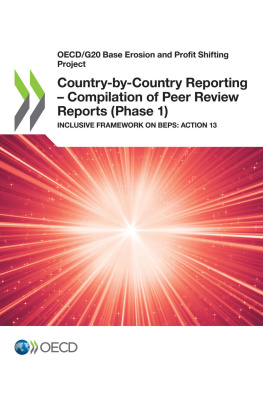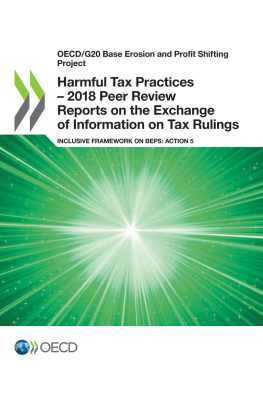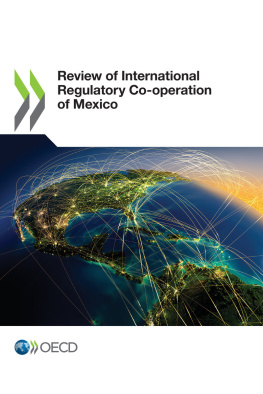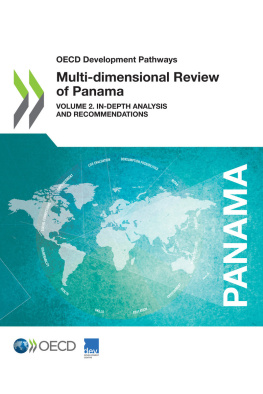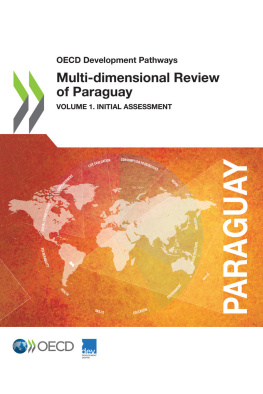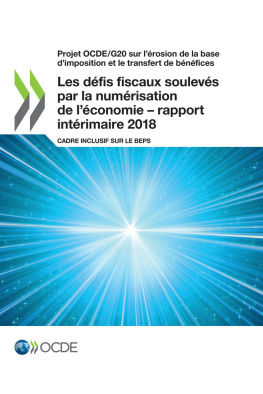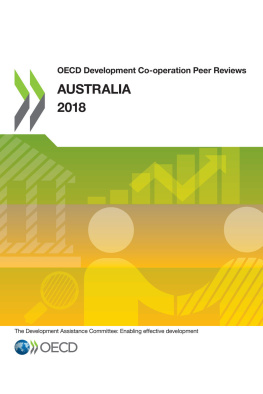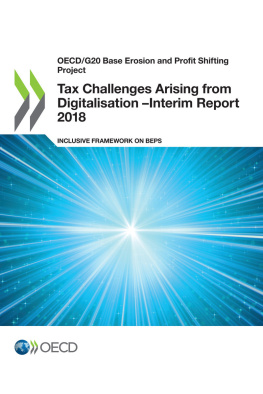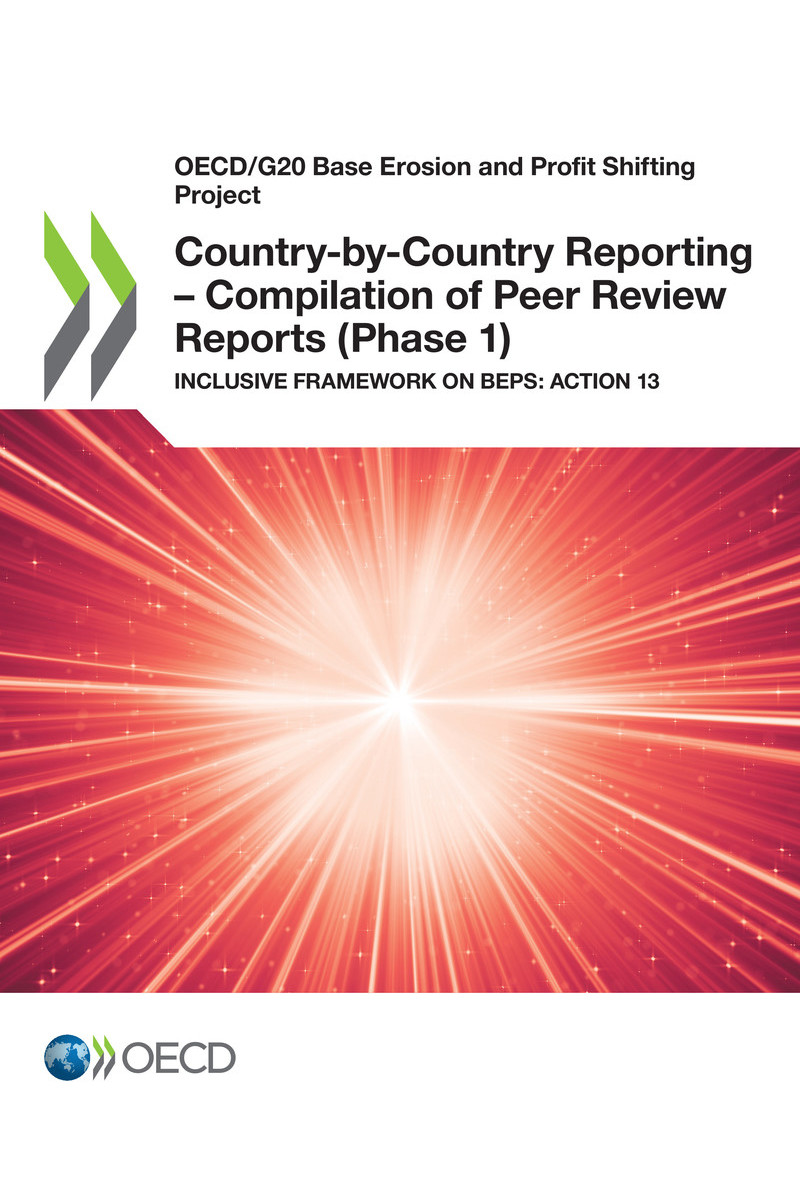OECD/G20 Base Erosion and Profit Shifting Project
Country-by-Country Reporting Compilation of Peer Review Reports (Phase 1) Inclusive Framework on BEPS: Action 13
Please cite this publication as:
OECD (2018), Country-by-Country Reporting Compilation of Peer Review Reports (Phase 1): Inclusive Framework on BEPS: Action 13 , OECD/G20 Base Erosion and Profit Shifting Project, OECD Publishing, Paris.
http://dx.doi.org/10.1787/9789264300057-en
Metadata, Legal and Rights
ISBN: 978-92-64-30005-7 (pdf) - 978-92-64-30097-2 (HTML) - 978-92-64-30098-9 (epub)
DOI: http://dx.doi.org/10.1787/9789264300057-en
Series: OECD/G20 Base Erosion and Profit Shifting Project
ISSN: 2313-2604 (print) - 2313-2612 (online)
This work is published under the responsibility of the Secretary-General of the OECD. The opinions expressed and arguments employed herein do not necessarily reflect the official views of OECD member countries.
This document, as well as any data and any map included herein, are without prejudice to the status of or sovereignty over any territory, to the delimitation of international frontiers and boundaries and to the name of any territory, city or area.
The statistical data for Israel are supplied by and under the responsibility of the relevant Israeli authorities. The use of such data by the OECD is without prejudice to the status of the Golan Heights, East Jerusalem and Israeli settlements in the West Bank under the terms of international law.
Photo credits: Cover ninog - Fotolia.com.
Corrigenda to OECD publications may be found on line at: www.oecd.org/publishing/corrigenda .
OECD 2018
You can copy, download or print OECD content for your own use, and you can include excerpts from OECD publications, databases and multimedia products in your own documents, presentations, blogs, websites and teaching materials, provided that suitable acknowledgement of OECD as source and copyright owner is given. All requests for public or commercial use and translation rights should be submitted to .
Foreword
The integration of national economies and markets has increased substantially in recent years, putting a strain on the international tax rules, which were designed more than a century ago. Weaknesses in the current rules create opportunities for base erosion and profit shifting (BEPS), requiring bold moves by policy makers to restore confidence in the system and ensure that profits are taxed where economic activities take place and value is created.
Following the release of the report Addressing Base Erosion and Profit Shifting in February 2013, OECD and G20 countries adopted a 15-point Action Plan to address BEPS in September 2013. The Action Plan identified 15 actions along three key pillars: introducing coherence in the domestic rules that affect cross-border activities, reinforcing substance requirements in the existing international standards, and improving transparency as well as certainty.
After two years of work, measures in response to the 15 actions were delivered to G20 Leaders in Antalya in November 2015. All the different outputs, including those delivered in an interim form in 2014, were consolidated into a comprehensive package. The BEPS package of measures represents the first substantial renovation of the international tax rules in almost a century. Once the new measures become applicable, it is expected that profits will be reported where the economic activities that generate them are carried out and where value is created. BEPS planning strategies that rely on outdated rules or on poorly co-ordinated domestic measures will be rendered ineffective.
Implementation is now the focus of this work. The BEPS package is designed to be implemented via changes in domestic law and practices, and in tax treaties. With the negotiation for a multilateral instrument (MLI) having been finalised in 2016 to facilitate the implementation of the treaty related measures, over 75 jurisdictions are covered by the MLI. The entry into force of the MLI on 1 July 2018 paves the way for swift implementation of the treaty related measures. OECD and G20 countries also agreed to continue to work together to ensure a consistent and co-ordinated implementation of the BEPS recommendations and to make the project more inclusive. Globalisation requires that global solutions and a global dialogue be established which go beyond OECD and G20 countries.
A better understanding of how the BEPS recommendations are implemented in practice could reduce misunderstandings and disputes between governments. Greater focus on implementation and tax administration should therefore be mutually beneficial to governments and business. Proposed improvements to data and analysis will help support ongoing evaluation of the quantitative impact of BEPS, as well as evaluating the impact of the countermeasures developed under the BEPS Project.
As a result, the OECD established an Inclusive Framework on BEPS, bringing all interested and committed countries and jurisdictions on an equal footing in the Committee on Fiscal Affairs and all its subsidiary bodies. The Inclusive Framework, which already has more than 110 members, is monitoring and peer reviewing the implementation of the minimum standards as well as completing the work on standard setting to address BEPS issues. In addition to BEPS members, other international organisations and regional tax bodies are involved in the work of the Inclusive Framework, which also consults business and the civil society on its different work streams.
This report was approved by the Inclusive Framework on BEPS on 12 April 2018 and prepared for publication by the OECD Secretariat.
Abbreviations and acronyms
AEOI
Automatic Exchange of Information
ATO
Australian Taxation Office
BEPS
Base Erosion and Profit Shifting
CAA
Competent Authority Agreement
CbCR
Country-by-Country Reporting
CFS
Consolidated Financial Statements
CITA
Corporate Income Tax Act
CRS
Common Reporting Standard
CTS
Common Transmission System
DTA
Double Taxation Arrangement
ECF
Tax Accounting Bookkeeping (escriturao contbil fiscal)
ECI
Estimated Chargeable Income
EOI
Exchange of Information
FAQ
Frequently Asked Questions
FATCA
Foreign Account Taxpayer Compliance Act
FIRSEA
Federal Inland Revenue Service Establishment Act
FRS
Financial Reporting Standard
FTA
Federal Tax Administration

